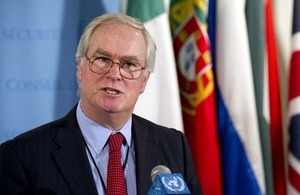‘The UK supports broadening Council membership’
Statement by Ambassador Lyall Grant, of the UK Mission to the UN, to the General Assembly Debate On Security Council Reform

Mark Lyall Grant
Thank you Mr President,
I would like to thank the Permanent Representative of China for introducing the Security Council report this morning.
Mr President,
The United Kingdom is pleased to make a statement on Security Council reform. It is an opportunity for us to highlight our clear commitment to reforming the Security Council so that it is more representative of the modern world.
We know that the vast majority of member states share this overarching aim. However, the proposals for what shape reform should take differ and will require genuine negotiation to find a common view. It is time for that negotiation to start.
The United Kingdom supports broadening Council membership to include permanent seats for Brazil, Germany, India and Japan, along with permanent African representation. We also support expansion of members in the non-permanent category. But while our positive position on reform is well established, we nonetheless welcome new initiatives that can provide much-needed momentum to the reform debate and we remain willing to work with all parties and groups that share that commitment.
Mr President,
In this spirit, we welcome the re-appointment of Ambassador Tanin as chair of the intergovernmental negotiations. He has worked tirelessly in this role and we support his continued efforts to find a way forward in the intergovernmental negotiations. We also welcome your initiative to create an Advisory Group and we look forward to discussing their ideas and proposals with the wider membership. The key to unlocking progress on reform is to establish a common position from which we can all move forward together.
Mr President
We have noted the French proposal on the use of the veto and agree that it is essential that the Security Council acts to stop mass atrocities and crimes against humanity.
For our part, the United Kingdom cannot envisage circumstances where we would use our veto to block action to avert a mass atrocity or to stop crimes against humanity.
We will continue to work within the Council to ensure that it meets its responsibilities as set out in the Charter and will continue to work with the wider membership for reform of the Council that both makes it more representative and enhances its effectiveness.
Mr President,
I would like to take this opportunity to reaffirm the United Kingdom’s commitment and efforts to improving the Security Council’s working methods. Much has been achieved in the last few years to improve both the transparency and effectiveness of the Security Council, including more Open Debates. We heard from my Chinese colleague that there were 174 public meetings of the Security Council in the last 12 months. There have been more Arria-style meetings and more use of video conference facilities. At the Council debate on Working Methods on 29 October, I suggested measures for improving the Council’s efficiency, including keeping interventions to the allocated time, as well as advocating that the Council expand its work on conflict prevention through mechanisms already at its disposal, such as horizon scanning. We will continue to make such proposals in the belief that an effective and transparent Council is in the interest of all Member States.
I thank you Mr President.